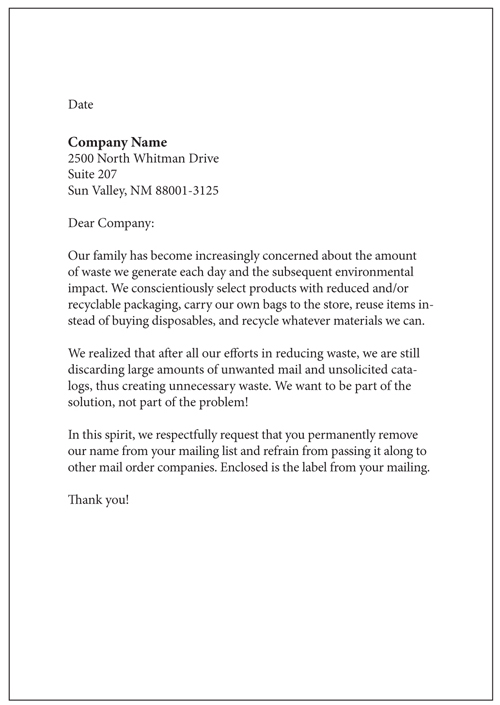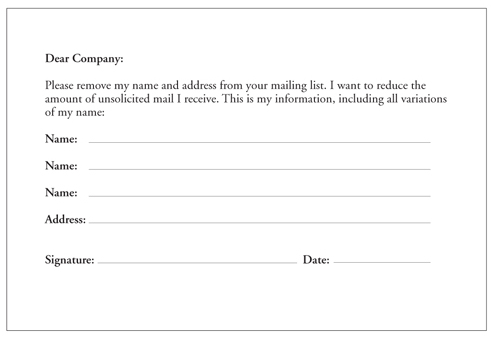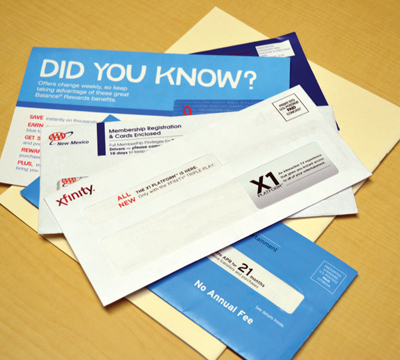Junk Your Junk Mail
Guide G-107
Fahzy Abdul-Rahman
College of Agricultural, Consumer and Environmental Sciences, New Mexico State University
Author: Extension Family Resource Management Specialist, Department of Extension Family and Consumer Sciences, New Mexico State University. (Print friendly PDF)
Introduction
Is your mailbox filled with junk mail—catalogs, advertisements, and other promotional mail you don't want to receive? Not only is junk mail a nuisance for those who don't want it but it also contributes to the solid waste problem and drains natural resources.
In her book Living Green, Nancy Conner (2009) points out that companies mail out more than 100 billion pieces of junk mail every year using paper from 100 million trees, 28 billion gallons of water, and enough energy to produce more than 9 million cars. What's worse, half of all junk mail is thrown out unread. In addition, items such as catalogs and brochures are often printed on slick, glossy virgin paper that is difficult to recycle. It is bad enough that the average American uses more than 748 pounds of paper per year, which requires almost 29,000 gallons of water to produce (Heist, 2012). Collective efforts to eliminate junk mail will greatly save natural resources and our time dealing with junk mail.
If you enjoy reading junk mail, that is fine. If you do not, there are steps you can take to prevent and to reduce the amount of unwanted junk mail in your mailbox.
Prevent Unwanted Mail Before It Starts
Steps to minimize the chances of getting junk mail are:
- Choosing to be unlisted in phone directories,
- Avoiding sweepstakes or contests that require your personal information on the forms,
- Not submitting product warranty information via mail or online (companies create mailing lists using your information; usually your receipt from purchasing a product is sufficient for warranty purposes), and
- Asking organizations that you deal with (e.g., for business, volunteering, affiliation, and donation purposes) to not share your information with other parties.
Stop Unwanted Mail
There are several things you can do to stop future junk mail:
- DMAchoice: Signing up with DMAchoice places you on a "delete" list from many national companies for five years. To register with DMA's Mail Preference Service, go to www.dmachoice.org, or mail your request with a $1 processing fee to:
DMAchoice
Direct Marketing Association
P.O. Box 643
Carmel, NY 10512
Be sure to include all names and all versions of these names (e.g., misspellings of your name) under which you receive junk mail. A sample letter is included in this publication.
- Prescreened offers of credit and insurance: You may opt out of getting any of these offers for five years or permanently by calling 1-888-5-OPT-OUT (1-888-567-8688), registering at www.optoutprescreen.com, or writing to the four major consumer reporting agencies, which are:
Experian
Opt Out
P.O. Box 919
Allen, TX 75013TransUnion
Name Removal Option
P.O. Box 505
Woodlyn, PA 19094Equifax, Inc.
Options
P.O. Box 740123
Atlanta, GA 30374Innovis Consumer Assistance
P.O. Box 495
Pittsburgh, PA 15230
You need to include your name, home telephone number, Social Security number, and date of birth.
- Catalogs: You can request to not receive catalogs, phone books, directories, and other junk mail via www.catalogchoice.org. This site aggregates many companies that do mail marketing, and you can stop receiving their mailed materials. You may need to enter "Account or Customer Number" and/or "Key or Source Code" to ensure or speed up the cancellation process. These numbers are usually printed around your address on the mailed materials.
- Yellow Pages Opt-Out: As mentioned previously, you may do directory cancellations via www.catalogchoice.org, but you may be directed to www.yellowpagesoptout.com for some directories' cancellations.
- Deceased: www.DMAchoice.org also provides the option to place a deceased person on the Deceased Do Not Contact List, which all Direct Marketing Association members must honor.
If you decide to write your request, here is a sample of a letter or postcard requesting that your name be dropped:
Sample Letter

Sample Postcard

Others
Taking these measures may not solve all of your junk mail problems because all businesses do not belong to DMAchoice, and local organizations may not receive notice to take your name off of their lists. Examples are sweepstakes, charity, non-profit, and non-participating organizations. You will need to contact the organizations or companies directly via mail or telephone. Their contact information is usually on the mailed materials that you received.
Other ways you may want to consider to reduce various types of "junk" include:
- Opting to get bills, pay bills, and obtain statements online. These include those for utility, banks, investments, cable, and credit cards.
- E-mail: Although you may choose to direct e-mails from unknown senders to your e-mail's junk folder, using www.DMAchoice.org allows you to opt out from receiving e-mails from participating companies for six years.
- National Do Not Call Registry: To register your number, visit www.DoNotCall.gov or call 1-888-382-1222 from the phone number you want to register.
- Robocall: This refers to recorded phone messages that may require you to press numbers. The simplest thing to do is to hang up. You may report robocalls to the Federal Trade Commission online (www.ftc.gov/complaint) or over the phone (1-888-382-1222).
References
Conner, N. 2009. Living green: The missing manual. Sebastopol, CA: O'Reilly Media.
Direct Marketing Association. 2013. www.dmachoice.org [Online].
Federal Trade Commission. 2011. Stopping unsolicited mail, phone calls, and email [Online]. Retrieved May 25, 2013, from https://www.consumer.ftc.gov/articles/0262-stopping-unsolicited-mail-phone-calls-and-email
Federal Trade Commission. n.d. Robocalls [Online]. Retrieved May 22, 2013 from https://www.consumer.ftc.gov/features/feature-0025-robocalls
Heist, V.G. 2012. Organize this! Practical tips, green ideas, and ruminations about your CRAP. CreateSpace Independent Publishing Platform.
Opt Out Services LLC. 2013. www.optoutprescreen.com [Online].
TrustedID. 2013. www.catalogchoice.org [Online].
Original author: Susan Wright, Extension Consumer Education specialist. Subsequent revision by Constance Kratzer, Family Resource Management specialist.

Fahzy Abdul-Rahman is the Extension Family Resource Management Specialist at New Mexico State University. He earned his Ph.D. and M.P.H. from The Ohio State University. His Extension programs focus on various personal finance topics, from basic banking to retirement planning.
To find more resources for your business, home, or family, visit the College of Agricultural, Consumer and Environmental Sciences on the World Wide Web at pubs.nmsu.edu.
Contents of publications may be freely reproduced for educational purposes. All other rights reserved. For permission to use publications for other purposes, contact pubs@nmsu.edu or the authors listed on the publication.
New Mexico State University is an equal opportunity/affirmative action employer and educator. NMSU and the U.S. Department of Agriculture cooperating.
Revised and electronically distributed October 2013, Las Cruces, NM.



